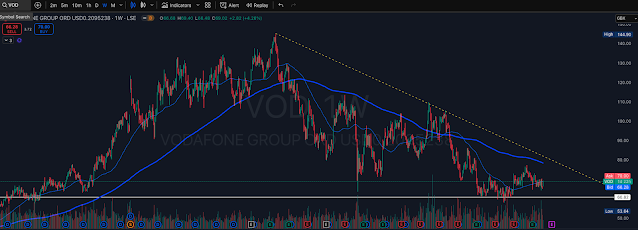Vodafone Group Plc ($VOD), one of the world’s leading telecommunications companies, is currently trading at historically low levels. With its stock price beaten down more than 50% from its highs, is now the right time to start accumulating? Let's analyze its fundamentals and growth prospects to determine if it presents a compelling investment opportunity.
A Brief Overview of Vodafone
Vodafone is a multinational telecom giant headquartered in the UK, operating in over 20 countries and partnering with networks in 48 more. The company provides mobile, broadband, and digital services to hundreds of millions of customers worldwide. It has played a significant role in shaping the global telecom industry, pioneering advancements in 5G, IoT (Internet of Things), and enterprise solutions.
Despite its strong global presence and innovation-driven approach, Vodafone’s stock has struggled in recent years due to competitive pressures, regulatory challenges, and macroeconomic headwinds. However, the current valuation metrics suggest that the stock might be heavily undervalued.
Valuation and Financial Metrics
Vodafone’s stock is currently trading at around $8 per share, significantly below its fair value, which is estimated to be approximately $12 per share—a 40% upside potential. Let’s break down some key valuation and financial indicators:
- Price-to-Book (P/B) Ratio: 0.32, indicating that Vodafone is trading at a deep discount relative to its assets.
- PEG Ratio: 0.7, suggesting the stock is undervalued based on its expected earnings growth.
- Price-to-Earnings (P/E) Ratio: 8.49, with a forward P/E of 8.78, indicating a relatively low valuation compared to historical levels.
- Earnings Growth: Expected EPS growth of 20% next year and 12% over the next five years.
- Institutional Transactions: Up 50% in the last three months, suggesting that major investors are showing renewed confidence in the stock.
- Dividend Yield: Over 8%, making it an attractive income-generating stock for dividend investors.
Is Vodafone a Buy?
The combination of a high dividend yield, strong institutional interest, and promising growth projections makes Vodafone an interesting opportunity for long-term investors. The company has been restructuring its operations, selling off underperforming assets, and investing heavily in next-generation telecom infrastructure, including 5G and fiber networks.
At current levels, Vodafone appears to be a deep-value stock with strong upside potential. While risks remain, particularly from regulatory and competitive pressures, the low valuation, solid fundamentals, and high dividend yield present an attractive risk-reward profile.
For investors looking for a turnaround story in the telecom sector, Vodafone might be worth considering. What do you think? Is it time to start accumulating $VOD? Let us know in the comments!


Comments
Post a Comment